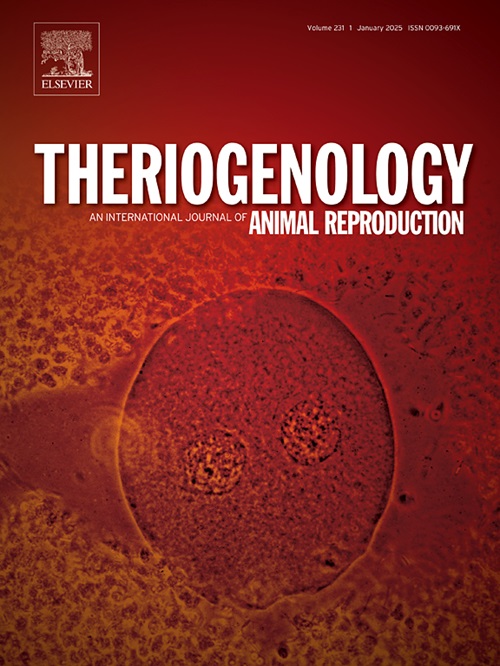Effect of zinc supplementation on bovine luteal function: In vivo and in vitro findings
IF 2.4
2区 农林科学
Q3 REPRODUCTIVE BIOLOGY
引用次数: 0
Abstract
Zinc (Zn) is an essential trace element for cellular processes such as oxidative stress regulation. Research on the relationship between Zn and the corpus luteum (CL) is limited, showing contradictory findings. Zinc supplementation before artificial insemination (AI) increases bovine CL size and progesterone (P4) levels. In mice, in vitro experiments suggest that Zn may reduce P4 production. This study aimed to evaluate the role of Zn in bovine luteal cell function by assessing 1) the effect of parenteral Zn supplementation (400 mg) 7 days after AI on CL size and plasma P4 levels in vivo, and 2) the impact of Zn supplementation (0, 0.8 and 1.2 μg/ml) on P4 production, reactive oxygen species (ROS) levels and luteal cell viability in vitro. In vivo, Zn supplementation increased CL size but reduced plasma P4 levels. In vitro, 0.8 μg/ml Zn decreased P4 synthesis and ROS levels while enhancing cell viability, whereas 1.2 μg/ml Zn had no significant effect compared to the control. These findings indicate that Zn modulates luteal function in a dose-dependent manner, reducing oxidative stress while impairing P4 production. Further studies are needed to optimize Zn supplementation strategies during assisted reproductive technologies and clarify Zn mechanisms of action.
补充锌对牛黄体功能的影响:体内和体外研究结果
锌(Zn)是氧化应激调节等细胞过程所必需的微量元素。有关锌与黄体(CL)之间关系的研究十分有限,研究结果相互矛盾。人工授精(AI)前补锌可增加牛黄体大小和孕酮(P4)水平。在小鼠体内,体外实验表明锌可能会减少 P4 的产生。本研究旨在评估锌在牛黄体细胞功能中的作用,方法是:1)人工授精后 7 天肠道外补充锌(400 毫克)对体内 CL 大小和血浆 P4 水平的影响;2)体外补充锌(0、0.8 和 1.2 微克/毫升)对 P4 产量、活性氧(ROS)水平和黄体细胞活力的影响。在体内,锌补充剂增加了 CL 的大小,但降低了血浆 P4 水平。在体外,0.8 μg/ml Zn 可降低 P4 合成和 ROS 水平,同时提高细胞活力,而 1.2 μg/ml Zn 与对照组相比没有显著影响。这些研究结果表明,锌以剂量依赖的方式调节黄体功能,在减少氧化应激的同时损害 P4 的产生。要优化辅助生殖技术期间的锌补充策略并阐明锌的作用机制,还需要进一步的研究。
本文章由计算机程序翻译,如有差异,请以英文原文为准。
求助全文
约1分钟内获得全文
求助全文
来源期刊

Theriogenology
农林科学-生殖生物学
CiteScore
5.50
自引率
14.30%
发文量
387
审稿时长
72 days
期刊介绍:
Theriogenology provides an international forum for researchers, clinicians, and industry professionals in animal reproductive biology. This acclaimed journal publishes articles on a wide range of topics in reproductive and developmental biology, of domestic mammal, avian, and aquatic species as well as wild species which are the object of veterinary care in research or conservation programs.
 求助内容:
求助内容: 应助结果提醒方式:
应助结果提醒方式:


